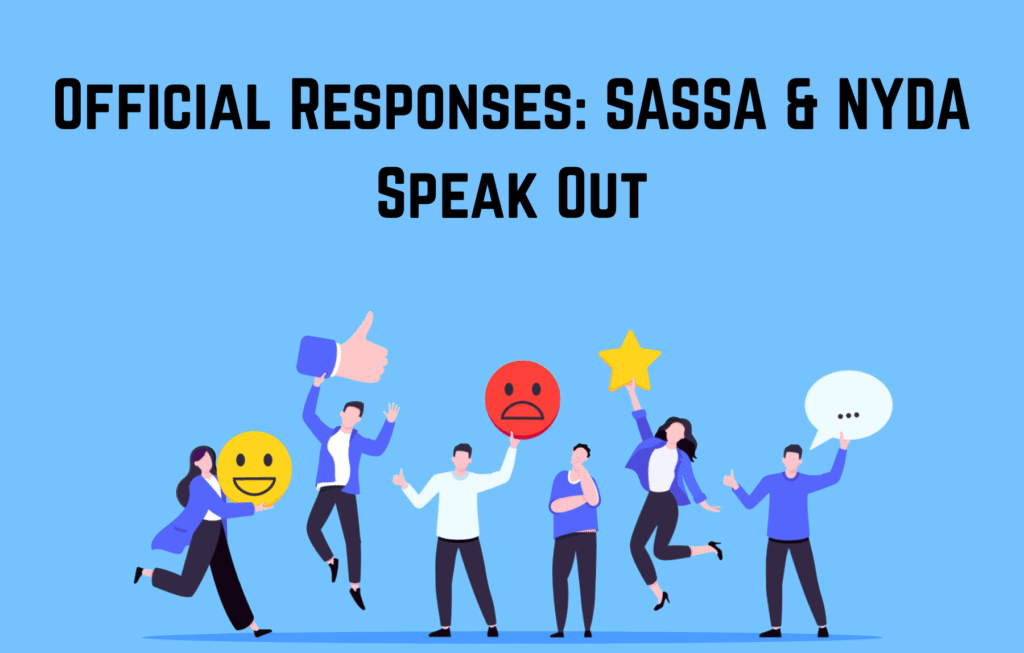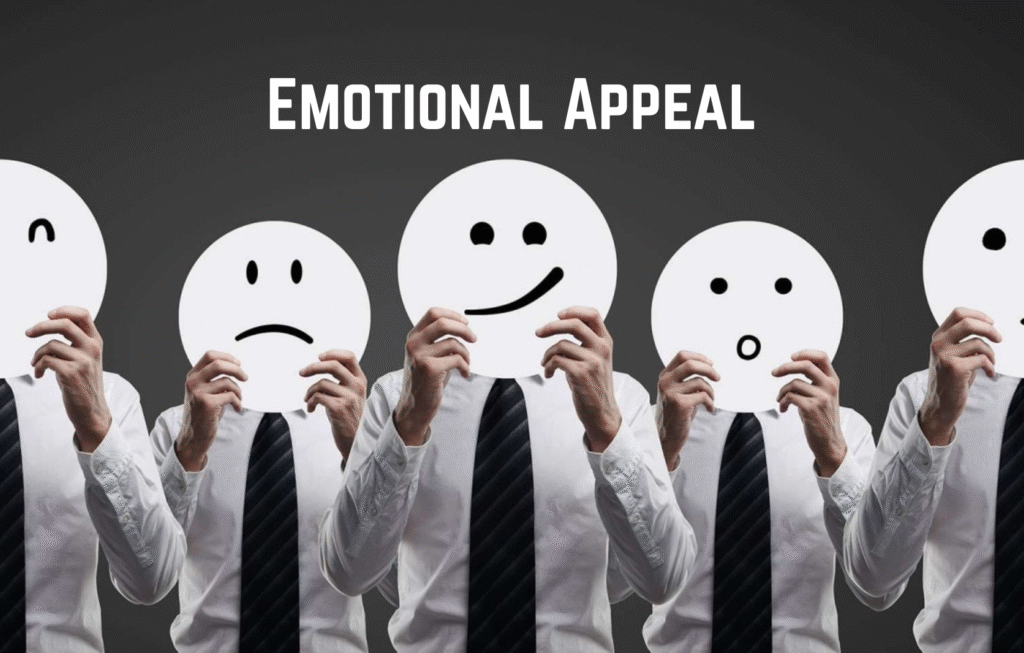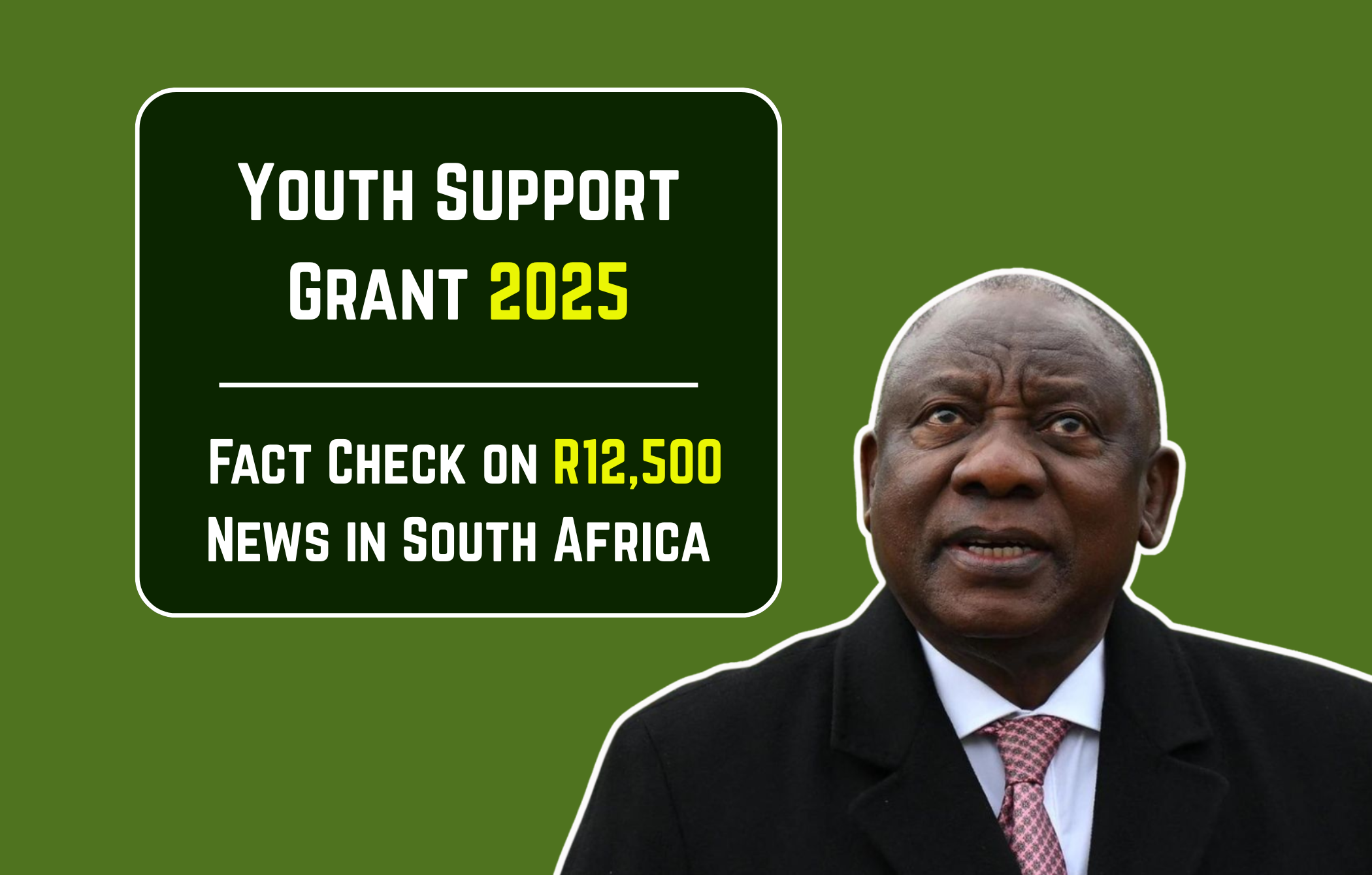Youth Support Grant 2025: The R12,500 Viral Claim — Fact vs Fiction
In mid-2025, a claim went viral across South African social media: that young, unemployed citizens between 18 and 35 years old who are not receiving any government assistance would be eligible to receive a once-off grant of R12,500. This “Youth Support Grant” made waves on TikTok, WhatsApp, Facebook, Instagram, and other platforms, stirring hope and confusion.
However, the claim has been firmly rejected by official bodies. Both the South African Social Security Agency (SASSA) and the National Youth Development Agency (NYDA) have publicly denounced the grant as fake news. No formal government programme currently provides a one-time R12,500 payment to youth as described in the viral posts.
Below is a careful examination of the background, why the claim spread, what official agencies have said, the risks involved, and what real programmes do exist.
1. How the Claim Spread — Origins & Mechanics of the Hoax

Viral Videos & Social Media Posts
The narrative typically appeared in short videos or audio snippets claiming that applications opened in August 2025, requiring that recipients be unemployed, between 18 and 35, not already on any social grant, and in possession of a business plan or willing to start a small enterprise. The posts often urged people to act quickly, share widely, or submit documents to unfamiliar websites or WhatsApp numbers.
Because of South Africa’s high youth unemployment, the idea resonated strongly. Many users forwarded the posts without fact-checking, hoping to help friends or family.
Lack of Official Announcements
Notably, there was no corroborating announcement from government channels — no press release, no mention in parliamentary records, and no indication in budgets or official policy documents. This absence gave the claim a shaky foundation.
Fake news sites and unverified blogs amplified the claim, often embedding the motif of “limited time only” or “apply now” to increase urgency. Some even copied official logos and formatting to imitate legitimacy.
Psychological Pull
When people are economically vulnerable, promises of “free money” tend to attract attention. The R12,500 figure sounded both substantial and believable to many — enough to garner clicks, shares, and attention. In environments where trust in institutions is low, hopeful rumors can spread rapidly.
2. Official Responses: SASSA & NYDA Speak Out

NYDA’s Position
The NYDA strongly disassociated itself from the viral claim. It stated that “we are not offering any once-off R12,500 Youth Grant.” The agency also emphasized that all legitimate applications for NYDA programmes are carried out only through its official ERP portal (Enterprise Resource Planning).
NYDA urged the public not to share personal information or banking details with unknown parties or respond to unsolicited messages purporting to represent the agency.
SASSA’s Warning
SASSA also issued a stern warning via its verified social media accounts, labeling the claim as fake information that “does not come from SASSA.”
The agency alerted its beneficiaries and the public to ignore posts that require new “registrations,” “re-registrations,” or that state non-compliance will result in loss of benefits — these are common tactics in scams.
Joint Clarification
Both agencies have stressed that any new or existing youth grant or social support programme will be communicated via official channels only: government websites, official gazettes, or verified agency social media. Nothing has been announced matching the viral claim.
Thus, the official view is unambiguous: the R12,500 youth grant is not real.
3. Why the Hoax Persists & Gains Traction
High Youth Unemployment
South Africa faces a chronic and deep youth unemployment challenge. According to recent labour surveys, youth unemployment is estimated at around 46.1%, while the overall national unemployment rate hovers above 33%.
In such a context, many young people are desperate for relief or opportunity, making them more vulnerable to believing misinformation that promises quick financial assistance.
Emotional Appeal

The claim framed the grant as a lifeline — for starting a business, paying for skills training, or supporting a household. That narrative taps into real needs and hope, making the message emotionally powerful and shareable.
Sophisticated Disinformation Techniques
Scammers and misinformation agents often borrow elements of authenticity:
- Mimicking official agency logos or styles
- Including credible sounding URLs or “.gov” address variants
- Using urgent language (“apply now,” “last chance”)
- Pairing claims with testimonials or fake endorsements
- Linking to third-party “application portals” or contact numbers
These tactics help mask the fraud. Many fake SASSA or youth grant stories are AI-generated or recycled variants designed to confuse recipients.
4. Risks & Dangers of Believing the Hoax
Identity Theft & Data Abuse
One of the major risks is that people respond to these scams by supplying sensitive personal information — ID numbers, bank account details, addresses, phone numbers — to unknown websites or individuals. These details can then be used for fraudulent purposes or identity theft.
Advance-Fee Scams
Some variants of the claim may require “processing fees” or payments to unlock the grant, or pay for “document submission.” Genuine government grants do not require upfront fees. Any request for payment is a major red flag.
Wasted Time & Disappointment
People might spend valuable time, energy, or resources chasing a false promise rather than focusing on real opportunities or programmes that exist. This can lead to emotional distress, frustration, and disillusionment.
Erosion of Trust
When repeated hoaxes and misinformation circulate, public trust in real government programmes can be undermined. Legitimate initiatives might be viewed skeptically, making outreach and social assistance harder to roll out.
5. How to Spot Scam Grant Offers — A Checklist
| Red Flag | What to Watch For |
|---|---|
| Claims of a large one-time cash grant with little or vague process | Government usually follows formal budget, policy, and announcement procedures |
| Requests for payment, “processing”, or “unlock” fees | Genuine grants never require you to pay upfront |
| Pressure tactics (“apply now,” “last chance”) | Legitimate programmes provide clear deadlines and grace |
| Unofficial links, unfamiliar websites, or WhatsApp contact numbers | Always cross-check domain names, look for “.gov.za” or verified portals |
| Asking for sensitive personal or bank information early on | Real programmes may request ID or verification — but not via unverified intermediaries |
| No mention on official websites, government gazettes, or agency channels | Always verify via SASSA, NYDA, national government portals |
If any of the above appear, treat the offer with suspicion.
6. What Real Youth Support & Grant Programmes Exist Now
Although the R12,500 youth grant is false, this does not mean there is no government support for youth in South Africa. Below are some genuine programmes and efforts currently active:
NYDA Enterprise & Business Support
NYDA offers entrepreneurial and enterprise development funding, mentorship, business vouchers, and training support for youth who qualify. These are not blanket cash grants; they are conditional, structured, and follow a formal application process via the NYDA ERP portal.
Presidential Youth Employment Intervention / SAYouth.mobi
This initiative is a government-backed platform (in collaboration with NYDA, Harambee, and other stakeholders) providing youth with opportunities to earn, learn, and train. It helps young people find work and skills development, though not through unmoderated cash payouts.
Social Grants via SASSA
While not a “youth grant,” SASSA manages social welfare payments (old age grants, child support, disability, etc.). Some individuals may qualify under existing schemes depending on their circumstances.
Skills Development & Training Programs
Various government departments and NGOs offer bursaries, apprenticeships, internship schemes, and technical training for youth. These are often announced publicly and require formal application procedures.
7. What You Should Do If You Encounter a Grant Claim
- Pause & Don’t Share Immediately
If you see a post promising R12,500 or similar, stop and scrutinize before forwarding it. - Verify via Official Sources
Check the SASSA website and NYDA website, or their official social media accounts. If it’s not announced there, it’s likely false. - Do Not Disclose Sensitive Information
Never send ID numbers, bank account numbers, or passwords to unknown contacts. - Avoid Paying Anything Upfront
Any “application fee” or “processing charge” is a red flag. - Report Suspicious Activity
Report the account or post to the social media platform. If you have shared personal info, notify your bank and relevant authorities (e.g., SAPS or anti-fraud units). - Engage with Verified Youth Support Programs
Focus your time on applying to real programmes via official channels. Don’t let fake claims distract you from viable opportunities.
8. Implications & Lessons Going Forward
The Power & Danger of Misinformation
The R12,500 hoax reveals how quickly misinformation can spread, especially in socioeconomically stressed communities. It underscores the importance of media literacy, digital verification, and critical thinking.
The Trust Deficit
The readiness to believe such claims reflects a deeper trust deficit in institutions. People are eager to find
relief — sometimes more willing to accept miracles than engage in long bureaucratic processes.
The Need for Transparent Communication
Government agencies need to communicate proactively and transparently with citizens, especially in times of crisis. Clear, easy-to-understand public announcements help close the space for misinformation.
Strengthening Channels for Youth Support
While false promises do harm, the underlying need is real. South Africa needs more robust, accessible, streamlined support systems — entrepreneurship funding, skills training, and job creation initiatives that make a difference in young lives.
9. Conclusion
The viral claim of a R12,500 Youth Support Grant in 2025 is not grounded in official policy or practice. It is a misinformation campaign, widely circulated, but conclusively denied by the relevant agencies, SASSA and NYDA.
Young South Africans deserve relevant, meaningful programmes — not empty promises. While the pressure of unemployment is real and urgent, jumping at every sensational claim can lead to disappointment or worse: being exploited. The best course is always to verify via official sources, avoid disclosing personal information to strangers, and apply for credible programmes using legitimate channels.
FAQs
1. Is the R12,500 Youth Support Grant real?
No, it’s fake. Both SASSA and NYDA confirmed that no such grant exists and the viral claim is misinformation not backed by any official government policy.
2. Who spread the R12,500 grant rumour?
The claim spread via viral TikTok, WhatsApp, and Facebook posts, often linking to fake websites or WhatsApp numbers. No legitimate government source has ever confirmed this grant.
3. What did NYDA say about the R12,500 claim?
NYDA officially denied offering any once-off R12,500 grant. They warned people not to share personal info and only use their verified ERP application platform.
